Iphone 7 Plus Screen Size Vs Iphone 11
iPhone 7 Discontinued
The iPhone 7 and iPhone 7 Plus, first released in 2016, are no longer flagship Apple devices, having been replaced by the iPhone 8, iPhone XS, XS Max, XR, iPhone 11, iPhone 11 Pro, and iPhone 11 Pro Max.
Apple stopped selling the iPhone 7 on September 10, 2019, following the debut of the new 2019 iPhone lineup.
Priced starting at $449 for a 64GB iPhone 7 or $569 for an iPhone 7 Plus, the two older iPhones are more affordable than the $599 iPhone 8, the $699 iPhone 8 Plus, $749 iPhone XR, the $999 iPhone XS, and the $1099 iPhone XS Max.
iPhone 7 and iPhone 7 Plus Specs and Features
Contents
- iPhone 7 Discontinued
- iPhone 7 and iPhone 7 Plus Specs and Features
- How to Buy
- Issues
- Germany Sales Ban
- Microphones and Audio
- Power Management for Depleted Batteries
- No Service
- LTE Performance
- Jet Black iPhone - Peeling Regulatory Labels
- Matte Black iPhone - Chipping
- Design
- Black and Jet Black Color Options
- Water Resistance
- Display
- 3D Touch
- Redesigned Home Button
- Taptic Engine
- Touch ID
- A10 Fusion Processor
- RAM
- No Headphone Jack
- AirPods
- Battery Life
- Camera
- Video
- iPhone 7 Plus - Dual Cameras
- FaceTime Camera
- Other Features
- Speakers
- Bluetooth, NFC, and FeliCa
- LTE
- Wi-Fi
- iPhone 7 Timeline
As of September 2017, the iPhone 7 and iPhone 7 Plus have been replaced by the iPhone 8, iPhone 8 Plus, iPhone X, iPhone XS, and iPhone XR. Apple is still selling the iPhone 7 and iPhone 7 Plus as lower-cost devices starting at $449, but the two iPhones are no longer the company's flagship smartphones.
On the surface, the iPhone 7 and the iPhone 7 Plus devices don't look very different from the previous-generation iPhone 6s and iPhone 6s Plus, continuing to feature the same 4.7 and 5.5-inch screen sizes and the same dimensions, but there are a few visual differences and several important internal changes.
Antenna bands no longer span across the back of the devices, for a cleaner, sleeker look, and there are new colors being sold alongside the standard Silver, Gold, and Rose Gold shades: a matte black color Apple is just calling "Black" and a "Jet Black" with a high-gloss finish.
Most notably when it comes to design, the body of the iPhone 7 has been reengineered to be IP67 dust and water resistant, so it can hold up to splashes, rain, and brief submersion in water. Apple's warranty doesn't cover water damage, though, so it's best to be cautious with water exposure.

There is no physical Home button on the iPhone 7, as it has been replaced by a "solid-state" pressure sensitive button that's connected to a redesigned Taptic Engine to deliver haptic feedback mimicking traditional button presses. The display is 25 percent brighter and supports wide color gamut for richer, true-to-life colors.
Inside, the iPhone 7 and iPhone 7 Plus are equipped with an A10 Fusion processor, which is 40 percent faster than the processor in the iPhone 6s. It features two high-performance cores for system intensive tasks and two high-efficiency cores that operate at 1/5 the power to save battery life for smaller tasks.
With the processor improvements, the two devices have the best battery life ever offered in an iPhone. Those upgrading from the iPhone 6s will see two additional hours of battery life on average, while those upgrading from the iPhone 6s Plus will see an additional hour.
There is no headphone jack in the iPhone 7, so headphones that connect to it need to be Bluetooth or equipped with a Lightning connector. Apple is shipping the iPhone with Lightning EarPods and a 3.5mm to Lightning adapter, plus it has designed completely wireless high-tech AirPods to ease the transition.
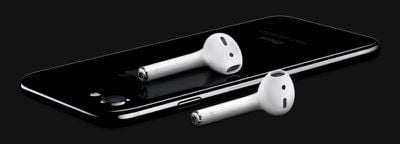
Stereo speakers, located at the top and bottom of the iPhone, are a new addition, and the biggest feature improvement comes in the form of an overhauled camera system. The iPhone 7 features a 28mm 12-megapixel camera with optical image stabilization, a wider f/1.8 aperture 6-element lens, wide color capture, and a revamped Apple image signal processor, all of which result in brighter, sharper, more detailed photos, even in low-light conditions.
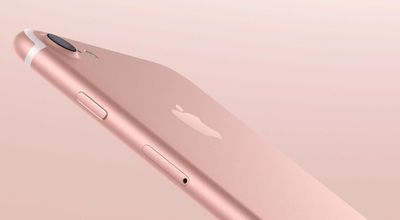
The iPhone 7 Plus features all of the camera improvements in the iPhone 7, but in addition to a 28mm wide-angle lens, it has a second 56mm telephoto lens for dual-camera functionality that enables better optical zoom. It also includes a new shallow-depth-of-field portrait mode that uses the two lenses to draw out the portrait subject while blurring the background.
Both iPhones have a four-LED flash that's 50% brighter and stronger, plus an upgraded 7-megapixel FaceTime HD camera with improved sensor technology and auto image stabilization for better selfies and clearer FaceTime calls.
Following the release of the iPhone 8 and iPhone 8 Plus, Apple lowered the price of the iPhone 7 and 7 Plus and slimmed down the iPhone 7 lineup. The two devices are now available in 32 and 128GB capacities, and there is no longer a (PRODUCT)RED model. Prices now start at $549 for the iPhone 7 and $669 for the iPhone 7 Plus.
How to Buy
In September of 2018, the iPhone 7 and iPhone 7 Plus lineup was simplified and prices were lowered significantly. There are now two capacities: 32GB and 128GB, and the device is available in Silver, Gold, Rose Gold, and Matte Black.
In the United States, iPhone 7 pricing starts at $449 for the 32GB model, with the 128GB model priced at $549. iPhone 7 Plus pricing starts at $569 for the 32GB model, with the 128GB model priced at $669.
Issues
Germany Sales Ban
As part of a legal dispute with Qualcomm, for a short period Apple has stopped selling iPhone 7 and iPhone 8 models in Germany. A German court in December ruled that Apple's older devices infringe on a Qualcomm patent related to a feature designed to preserve battery life when sending and receiving wireless signals.
Apple modified the iPhone 7 and 8 models in Germany to use Qualcomm modems to get around the ban, and the iPhone 7 and 8 are once again available in Germany. All German models in the country use LTE chips from Qualcomm.
Apple experienced a similar sales ban in China, but was able to overcome it with a software update removing patented functionality from iPhones.
Microphones and Audio
There is a microphone issue that affects some iPhone 7 and 7 Plus models, causing the microphone on the device not to work. Apple temporarily offered no-cost repairs to consumers in early 2018, but as of late 2018, the company again appears to be charging consumers for the issue once again. Apple charges over $300 for microphone-related repairs.
Apple is also facing two class action lawsuits over audio issues on the iPhone 7. Apple is accused of selling the iPhone 7 and 7 Plus with an audio chip defect that results in grayed out speaker buttons to issues being heard during phone calls and video chats.
Power Management for Depleted Batteries
In devices that have degraded lithium-ion batteries, Apple has introduced power management features that can slow down the iPhone during times of peak power draw to prevent unexpected shutdowns.
Apple first introduced the power management features in iOS 10.2.1, but the issue received additional attention at the end of 2017 after it became clear that power management involved slowing down iPhones with batteries that are running at a sub-optimal level.
Several lawsuits have been filed against Apple accusing the company of deliberately slowing devices to encourage upgrades, which Apple says it does not do. Power management features are designed to extend the life of the iPhone rather than shorten it.
Following significant backlash over the issue, Apple announced a $29 battery replacement program, allows customers who have an iPhone 6 or later to replace their batteries for $29 regardless of battery health.
Each older iPhone is entitled to one low-cost battery replacement. Supplies were limited in early 2018 due to demand, but Apple is offering reduced-cost batteries through the end of the year.
Customers who already paid for a battery replacement for an iPhone 6 or later in 2017 from Apple or an Apple Authorized Service Provider are eligible for a $50 credit.
Any customers who are affected by the power management features and slowdowns because of a depleted battery will see improved performance after replacing the battery. It's important to note, though, that even those affected by throttling will not see it at all times -- it only kicks in at certain times when the processor is taxed.
As promised back in December, iOS 11.3 introduces a new "Battery Health" section to the Battery portion of the Settings app, which provides iOS users with more information about the health of their iPhone battery.
It includes details on current maximum capacity, current operating performance, and if an iPhone is subjected to throttling via power management features, it offers a toggle to turn it off. More details can be found in our how to post.
Power management features impact the iPhone 6, iPhone 6 Plus, iPhone 6s, iPhone 6s Plus, iPhone SE, iPhone 7, and iPhone 7 Plus.
No Service
Apple has launched a repair program for iPhone 7 models impacted by an ongoing bug that causes them to say "No Service" even when cellular coverage is available.

Apple is offering free repairs for devices impacted by this issue, which includes iPhone 7 devices with the following model numbers: A1660, A1779, and A1780. Customers in need of a repair should contact Apple support, visit an Apple Authorized Service Provider, or visit an Apple retail store.
LTE Performance
The iPhone 7 and 7 Plus use different LTE modems, sourced from Intel and Qualcomm. The Intel modem only supports GSM and is limited to the AT&T and T-Mobile networks in the U.S., while the Qualcomm modem supports GSM/CDMA and is available for Verizon and Sprint. According to iPhone 7 Plus testing done by Cellular Insights, the Intel iPhone models perform worse than the Qualcomm models when in areas with poor signal. When signal strength is good, there are no performance problems, and real world experience may vary from user to user.
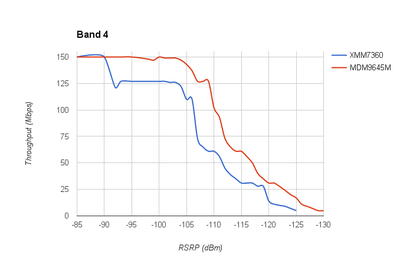
Apple may also be throttling the LTE performance of the Verizon iPhone 7 with a Qualcomm modem to keep it on par with the AT&T iPhone 7 with an Intel modem. Based on testing, the Verizon iPhone 7 should significantly outperform the AT&T iPhone 7, but instead, the two devices perform similarly with the Verizon iPhone 7 displaying only a slight edge.
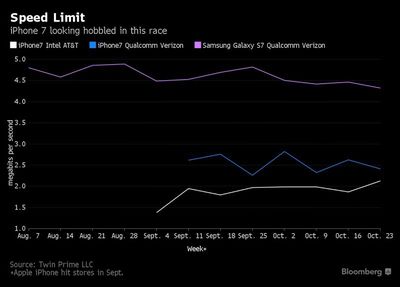
When compared to a Samsung Galaxy S7 that also has a Qualcomm chip, the Verizon iPhone 7 could not compete, suggesting Apple has limited its performance to ensure feature parity between iPhone models on different networks.
Jet Black iPhone - Peeling Regulatory Labels
Apple customers who purchased a Jet Black iPhone 7 or 7 Plus should exercise caution when using a device skin that covers the back of the smartphone. Several iPhone owners have discovered that when the skin is peeled off, it removes part of the regulatory labeling and rear text, such as "Designed by Apple in California."
Matte Black iPhone - Chipping
A number of customers who purchased the matte Black iPhone 7 or 7 Plus have noticed that the anodized finish on their devices has started chipping or peeling off in areas where there has allegedly been little wear. According to Apple, the chipping is a normal cosmetic issue and is not covered by warranty.
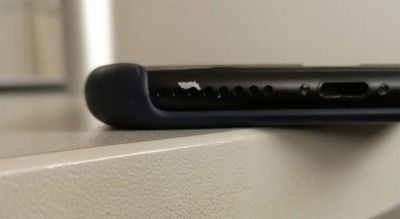
Design
On the outside, the iPhone 7 and the iPhone 7 Plus look a lot like the iPhone 6s and the iPhone 6s Plus. The dimensions, aside from weight, are identical. The iPhone 7 measures in at 138.3mm tall, 67.1mm wide, and 7.1mm thick, while the iPhone 7 Plus is 158.2mm tall, 77.9mm wide, and 7.3mm thick.
At 138 grams and 188 grams for the iPhone 7 and iPhone 7 Plus, respectively, the two devices are slightly lighter than previous-generation iPhones.
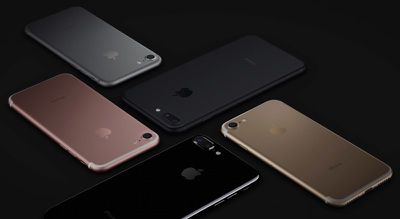
Design wise, there are few visual differences between the iPhone 6s and the iPhone 7, aside from relocated antenna bands that no longer span across the back of the iPhone and larger protruding cameras, a feature that is especially noticeable on the larger iPhone 7 Plus with a dual-camera setup.
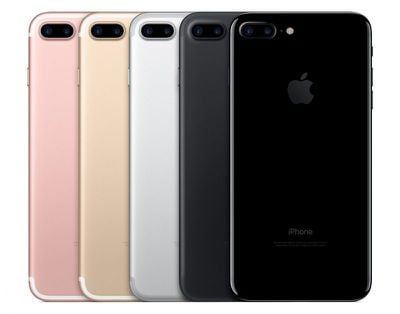
On the bottom of the iPhone 7, there's no longer a headphone jack. The space has been replaced by a second set of speaker holes, which are largely cosmetic. The first hole on the left side of the device is a microphone, while the rest are designed to match the right side of the phone.
Black and Jet Black Color Options
To distinguish the iPhone 7 from the iPhone 6s, Apple has focused on introducing two new colors sold alongside the traditional Gold, Rose Gold, and Silver finishes. There's a dark matte light-diffusing "Black" shade that replaces Space Gray and a glossy "Jet Black" that's entirely new, with a pristine, mirror-like surface.
The high-shine Jet Black color is achieved through a unique dye bath and anodization process, and while its finish is eye-catching, Apple warns that it is prone to "micro-abrasions" and recommends those who are worried about scratches keep it in a case.
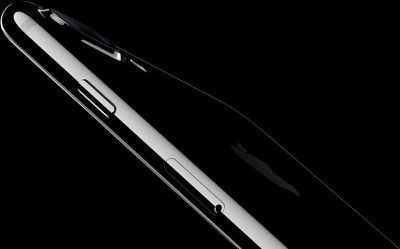
Water Resistance
The iPhone 7 might look a lot like the iPhone 6s, but it's been re-engineered from the inside out with new seals and new adhesive techniques to make it more water and dust resistant. It has a dust/water resistance rating of IP67, meaning it's entirely dust proof and able to withstand 1 meter of water for up to 30 minutes. It's safe from splashes and accidental submersion, but don't take it swimming.
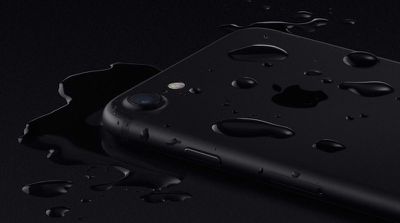
Tests have proven that the iPhone 7 can survive immersion in a variety of liquids, from coke and hot coffee to sea water. There's even been a test to see how well it does in deep water.
Display
Apple is using a display in the iPhone 7 that's 25 percent brighter than the display in the iPhone 6s, so it's going to look brighter and clearer outdoors, especially in full sunlight. The display is also using a cinema-standard wide color gamut and end-to-end color management, for more vivid, saturated colors.
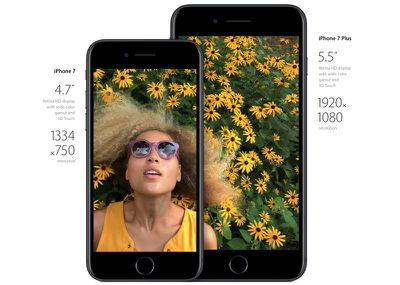
The resolution of the display is the same, at 1134 x 750 (326 ppi) for the iPhone 7 and 1920 x 1080 (401 ppi) for the iPhone 7 Plus, and the screen sizes continue to measure in at 4.7 inches for the iPhone 7 and 5.5 inches for the iPhone 7 Plus.
DisplayMate says the iPhone 7 has the "best LCD display" it's ever tested, calling it a "major upgrade" over the iPhone 6s.
iPhone 7 achieved the highest color accuracy, peak brightness, and contrast rating in bright light of any smartphone display, the highest contrast ratio of any IPS LCD display, and the lowest screen reflectance of any smartphone display.
3D Touch
3D Touch continues to be an integral part of the display, built into one of the display layers. 3D Touch is an expanded multi-touch feature that allows the iPhone to measure different levels of pressure in addition to taps, swipes, and pinches.
3D Touch is used across iOS 9 and iOS 10 to enable shortcut gestures called a "Peek" and a "Pop" both at the home screen and in iOS apps. A light press enables a Peek, while a deeper press enables a Pop, and there are unique swipe gestures to open up menus and take actions when using Peeks.
Redesigned Home Button
The Home button on the iPhone 7 looks like the iPhone 6s Home button, but it's no longer a physical button. Apple calls it a "solid state" button, and when you press on it, you get haptic feedback from the Taptic Engine to mimic a button press, similar to the trackpad on the latest MacBooks.
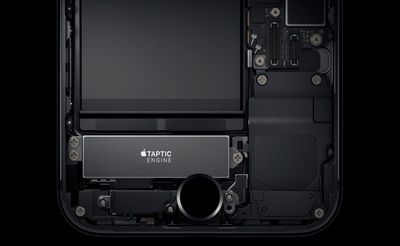
Instead of feeling the sensation of pressing down on an actual button, when you use the Home button on the iPhone 7, you'll feel haptic vibrations in response to let you know that actions like unlocking the iPhone's screen or making a payment with Apple Pay have been successful.
When setting up the iPhone 7, you can choose the level of haptic feedback you want, ranging from light to powerful, with a setting in the middle available. It should be noted that the iPhone 7 Home button is capacitive, requiring skin contact or the right kind of capacitive gloves to press. It otherwise won't register touch, unlike the physical home buttons of earlier devices.
Taptic Engine
The Home button in the iPhone 7 is powered by a redesigned and updated Taptic Engine, a piece of hardware that was first introduced in the iPhone 6s. According to Apple, the Taptic Engine is more responsive and works with a wider range of frequencies.
It is used throughout the iPhone 7 system for everything from the Home button to notification vibrations, and for the first time, it can be programmed by third-party applications for new feelings and experiences that were not previously available.
Touch ID
The Touch ID fingerprint sensor that replaces passwords and offers additional security for things like Apple Pay payments is still located on the Home button, despite the Home button's redesign.
Second-generation Touch ID technology is built into the iPhone 7 and the Touch ID fingerprint sensor is as quick as the one in the iPhone 6s.
A10 Fusion Processor
Apple improves the processor in each iteration of the iPhone, and in the iPhone 7, some impressive features have been included for the best chip performance in an iOS device yet. The A10 Fusion has a four-core CPU (the first in an iOS device) that combines power and efficiency in a unique way. It is "incredibly thin" and was made on TSMC's 16 nm FinFET+ process.
There are two high-performance cores, which are 40 percent faster than the A9 chip in the iPhone 6s and twice as fast as the A8 chip in the iPhone 6. There are also two high-efficiency cores that run at 1/5th of the speed of the high-performance cores to preserve battery when doing tasks that aren't system intensive.
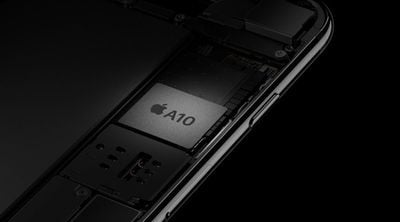
An Apple-designed performance controller switches between the two core systems and makes sure the correct processes are running for maximum performance and maximum battery. When doing something that requires the more powerful CPU, such as gaming, the high-power cores run. When doing something that doesn't require a lot of power, like sending a message or an email, the high-efficiency cores turn on to draw less power and use less battery.
Benchmarking tests have proven that the iPhone 7 and the iPhone 7 Plus are indeed equipped with the fastest mobile processor Apple has produced yet, outperforming the A9X in the 12.9-inch iPad Pro.
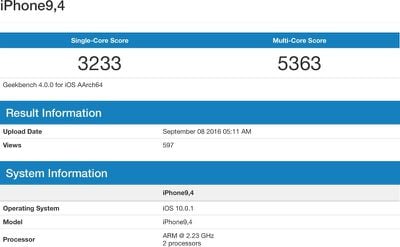
An iPhone 7 Plus benchmark
The iPhone 7 is faster than Samsung devices, even recent ones, and it can even outperform most MacBook Air models.
Along with the four-core CPU, the iPhone 7 features a six-core graphics chip that's 60 percent faster than the A9 and three times faster than the A8. At the same time, it draws one-third less power than the A9 and half as much power as the A8.
There is an embedded M10 motion coprocessor in the A10 Fusion chip that captures motion-based data from the compass, accelerometer, and gyroscope to power Apple's health and fitness capabilities without significant power drain.
For more detail on the A10 Fusion and the improvements it brings, make sure to check out our post covering the processor advancements introduced in the iPhone 7 and the Apple Watch Series 2.
RAM
Due to the increased demands of a dual-camera system and the software necessary to process images, Apple has equipped the iPhone 7 Plus with 3GB RAM.
The iPhone 7, which uses only a single lens camera, continues to have 2GB RAM like the iPhone 6s.
No Headphone Jack
There is no headphone jack in the iPhone 7, so headphones need to connect wirelessly or through the Lightning port. The removal of the headphone jack was done to save space and to make room for new technologies, plus Apple is using its elimination to drive the development of wireless headphone technology.

To ease the transition away from the 3.5mm headphone jack, Apple is including Lightning EarPods and a Lightning to 3.5mm adapter in each iPhone box. Apple has also developed new wireless headphones called AirPods and introduced new wireless Beats models.
AirPods
AirPods, Apple's new wireless earbuds, look a lot like standard EarPods without the wires. Reviews suggest they're similar in shape and size, but the internals are entirely different. There are no wires between the AirPods -- each operates independently. You can wear both at the same time or wear a single one for a phone or FaceTime call.
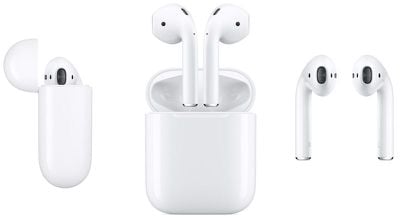
AirPods feature Bluetooth and an Apple-designed W1 chip, the first wireless chip Apple has created for intelligent, high-efficiency playback with a consistent, reliable connection. AirPods have an infrared sensor built in to detect when they're in the ear, and motion accelerometers respond to touch gestures, such as a double tap to activate Siri.
Voice accelerometers recognize when you're talking and then team up with beamforming microphones to reduce external noise, plus Apple says the AirPods have "incredible sound."
Apple's goal, which it says no one has achieved, is a "wireless future" where all devices intuitively connect. AirPods are the first step towards that goal. The W1, paired with iCloud, connect seamlessly to all Apple devices with a one-step setup procedure and can instantly switch between devices. Apple calls it a "magical experience."
AirPods last for five hours on a single charge and ship with a case that doubles as a battery source, for more than 24 total hours of battery life. AirPods and the case can be charged through a Lightning connector. AirPods are priced at $159.
Battery Life
According to Apple, processor improvements and bigger physical batteries have resulted in the longest battery life ever in an iPhone. Those upgrading from an iPhone 6s to an iPhone 7 will see two hours of additional battery life on average while iPhone 7 Plus users upgrading from an iPhone 6s Plus will see at least an hour more battery life. In most cases, users will see much greater increases in battery.
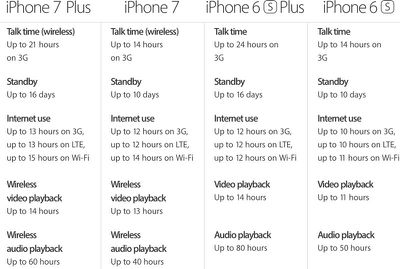
Curiously, when broken down on Apple's site, the iPhone 7 and 7 Plus get longer battery life during internet use and video playback, but shorter battery life for audio playback and talk time. Still, Apple says average battery life during real-world usage has improved.
Based on device teardowns, the iPhone 7 has a 1,960 mAh battery, an improvement over the 1,715 mAh battery in the iPhone 6s. The iPhone 7 Plus has a 2,900 mAh battery, up from 2,750 mAh in the iPhone 6s Plus.
Camera
The iPhone 7 and the iPhone 7 Plus feature a huge jump forward in camera technology, for photographs that are clearer, brighter, and crisper, even in low-light conditions.

Optical image stabilization, once a feature limited to the 5.5-inch iPhone, is built into the iPhone 7, compensating for small movements and hand shakiness when snapping a photo to allow for longer exposure times (3x longer than iPhone 6s). There's a new 6-element f/1.8 aperture lens that lets 50 percent more light into the sensor while keeping photos sharp at the edges.
The 12-megapixel high-speed sensor is 60 percent faster and 30 percent more efficient, and there's a new image signal processor with twice the throughput for faster camera performance across the board.
The image signal processor, custom designed by Apple, sets exposure, focus, white balance, and uses wide color capture for more true-to-life images. It features fourth-generation tone mapping and noise reduction, performing 100 billion operations in just 25 milliseconds every single time a photo is taken with the iPhone.
Wide color gamut support results in richer colors, especially for greens and some shades of red. Low-light photo capture is improved, and Live Photos feature stabilization, can be edited, and are accessible to third-party developers via new Capture and Edit APIs. In addition to facial recognition, the iPhone 7 also features full body recognition.
Professional camera tests have lauded the iPhone 7's excellent exposure, lower noise output, and richer colors, calling it a solid improvement over the camera in the iPhone 6s. The camera features great exposures with wide dynamic range, accurate white balance and color rendering, and good detail preservation when shooting outdoors in bright daylight.
A redesigned four-LED rear flash puts out 50 percent more light and reaches 50 percent further, plus it has a flicker sensor that can read the flickering of artificial lighting and can compensate for it in both photo and video.
The rear camera is protected by a sapphire lens cover to keep it safe from scratches.
Video
Video taking capabilities haven't been improved in the iPhone 7. It still includes 4K video recording at 30fps and 1080p video recording at 30 or 60fps. 1080p Slo-mo video support is available at 120fps and 240fps at 720p.
iPhone 7 Plus - Dual Cameras
All of the features built into the iPhone 7 are included in the iPhone 7 Plus, but it has one other unique feature -- a second lens. The first lens in the iPhone 7 Plus is the same wide-angle 28mm lens included in the iPhone 7, but it is installed alongside a second 12-megapixel 56mm telephoto lens with an f/2.8 aperture.
The two lenses create a new zoom feature that allows iPhone 7 Plus users to switch seamlessly between standard 1x zoom and an optical 2x zoom, right within the camera app. Optical zoom is superior to digital zoom because there's no loss of detail, but the 2x optical zoom function also enables better digital zoom for clearer photos up to 10x closer.
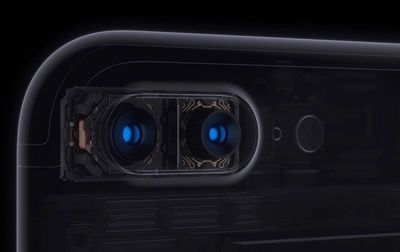
Apple says that because you're starting with a 2x lens when you zoom in with the iPhone 7 Plus, the quality is up to four times better than digital zoom in the iPhone 6s.
As of iOS 10.1, the two cameras in the iPhone 7 Plus can be used for a new "Portrait" feature that uses shallow depth of field to make portrait photos "pop," as is possible with a high-end DSLR. To achieve this, Apple's image signal processor scans a scene, using machine learning techniques to recognize people.
It creates a depth map of the image from the two cameras, keeping the people in focus while applying an artful blur to the background. There's even a Live Preview effect that lets you see the background blur before taking the photo, something that's unique to the iPhone. "Portrait" is a feature in the camera app alongside other options like "Video" and "Panorama."
FaceTime Camera
The iPhone 7 and 7 Plus feature a 7-megapixel FaceTime HD camera for better-than-ever selfies and clearer FaceTime calls. There's new sensor technology for sharper images, auto image stabilization to reduce shakiness, and the wide color capture feature of the rear-camera is also available on the FaceTime camera.
Other Features
Speakers
There are two speakers in the iPhone 7, introducing surround sound for the first time. One speaker is at the bottom of the phone and one is at the top, for stereo sound in both portrait and landscape orientations. The two speakers put out twice the volume of the single speaker in the iPhone 6s and have a better overall sound thanks to increased dynamic range.
Bluetooth, NFC, and FeliCa
The iPhone 7 features Bluetooth 4.2 for connecting to Bluetooth devices like the AirPods, and it has an NFC chip for use with Apple Pay.
New in iPhone 7 and 7 Plus models sold in Japan is a FeliCa chip, which allows them to work with the FeliCa payments standard that's been widely adopted in the country. In Japan, Apple Pay users can use the payments service anywhere Suica, iD, and QuicPay.
LTE
The iPhone 7 features LTE Advanced for data transfer speeds up to 450Mb/s and support on more LTE bands around the world.
Unlike the iPhone 6s and 6s Plus, which worked on any network, GSM iPhone 7 and 7 Plus models designed for the AT&T and T-Mobile networks are not compatible with the CDMA networks of Verizon and Sprint. This is because Apple has used LTE chips from both Qualcomm and Intel in its devices. GSM devices with Intel chips are not equipped with CDMA functionality, whereas Qualcomm chips work on both GSM and CDMA networks.

That means a T-Mobile or AT&T iPhone cannot later be used on the Verizon or Sprint network. Verizon and Sprint, iPhones, however, support both the GSM and CDMA networks and can later be used with AT&T or T-Mobile.
iPhone models A1660 and A1661 are Verizon and Sprint models compatible with GSM and CDMA networks.
iPhone models A1778 and A1784 are AT&T and T-Mobile models that are only compatible with GSM networks.
Wi-Fi
The iPhone 7 and 7 Plus support 802.11a/b/g/n/ac Wi-Fi with MIMO. The technology is the same as the Wi-Fi technology in the iPhone 6s and 6s Plus, with connection speeds that can reach up to a theoretical maximum of 866Mb/s.
Iphone 7 Plus Screen Size Vs Iphone 11
Source: https://www.macrumors.com/roundup/iphone-7/
Posted by: jacksonpeand1935.blogspot.com

0 Response to "Iphone 7 Plus Screen Size Vs Iphone 11"
Post a Comment